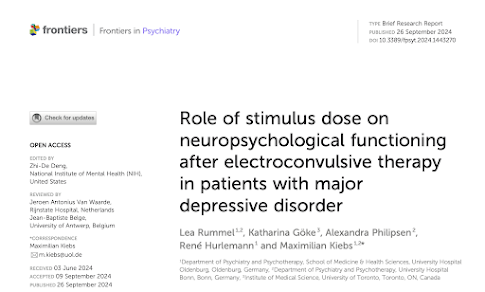Role of Stimulus Dose on Neuropsychological Functioning After ECT: Small Study From Germany
Out on PubMed, from authors in Germany and Canada, is this article:
Role of stimulus dose on neuropsychological functioning after electroconvulsive therapy in patients with major depressive disorder.
Front Psychiatry. 2024 Sep 26;15:1443270. doi: 10.3389/fpsyt.2024.1443270. eCollection 2024.PMID: 39398962
Introduction: Electroconvulsive therapy (ECT) is the most effective treatment for patients suffering from treatment-resistant depression but its use is often limited by the concern for cognitive side effects. This study examines the effect of ECT on autobiographical and verbal memory compared to a healthy control group and the impact of the mean stimulus dose on cognition after ECT.
Methods: Autobiographical and verbal memory were assessed in depressed patients and healthy controls before the first and within one week after the last ECT treatment. Neuropsychological testing included the Autobiographical Memory Interview, the Verbal Learning and Memory Test and five tests from the Cambridge Neuropsychological Test Automated Battery. The mean charge delivered across the ECT series and the total number of sessions were examined in relationship to cognitive impairment after ECT using a multiple regression model.
Results: Autobiographical memory was significantly impaired after ECT treatment compared to healthy controls. Baseline scores were lower for depressed patients on all cognitive domains. Improvements in performance after ECT were found on tests for executive functions and working memory. Effects of the mean charge delivered on cognitive functioning after ECT were heterogeneous across cognitive domains but significant for verbal retrograde memory.
Conclusion: ECT led to autobiographical memory impairment. The relationship between mean charge delivered and cognitive performance is heterogeneous across different cognitive domains and requires further research. Significant effects of the mean charge delivered were found without a significant difference in cognitive functioning compared to a healthy control group.
Keywords: charge; cognition; depression; electroconvulsive therapy; neuropsychology; treatment dose.
The article is here.
And from the text:
The results are actually supportive of the cognitive tolerability of ECT, not dire, as the Conclusion and abstract would have you believe. Importantly, the testing was done within one week after ECT; but little comment is made that any negative effects might be transient.
The most impressive finding is that depressed patients have worse memory than healthy controls at baseline. One week after ECT, some cognitive tests worsen, some improve.
I take to task both the authors and reviewers for allowing the Sterling anti-ECT brain damage diatribe (Reference #18) to be described as the author being "more cautious" about cognitive effects of ECT.
Witholding all kudos here...






In addition to the points of criticism already mentioned, it must be clearly emphasized once again that the timing of cognitive testing after an ECT series is of course crucial (here: too early and not used as a covariate), as cognitive side effects are reversible. Unfortunately, other relevant literature on AMI was overlooked in the discussion (e.g. Jelovac A, OʼConnor S, McCarron S, McLoughlin DM. Autobiographical Memory Specificity in Major Depression Treated With Electroconvulsive Therapy. J ECT. 2016 Mar;32(1):38-43. doi: 10.1097/YCT.0000000000000267.).
ReplyDeleteTo summarize, regrettably much remains unclear, except for the statement that it is indeed important to use healthy control groups.